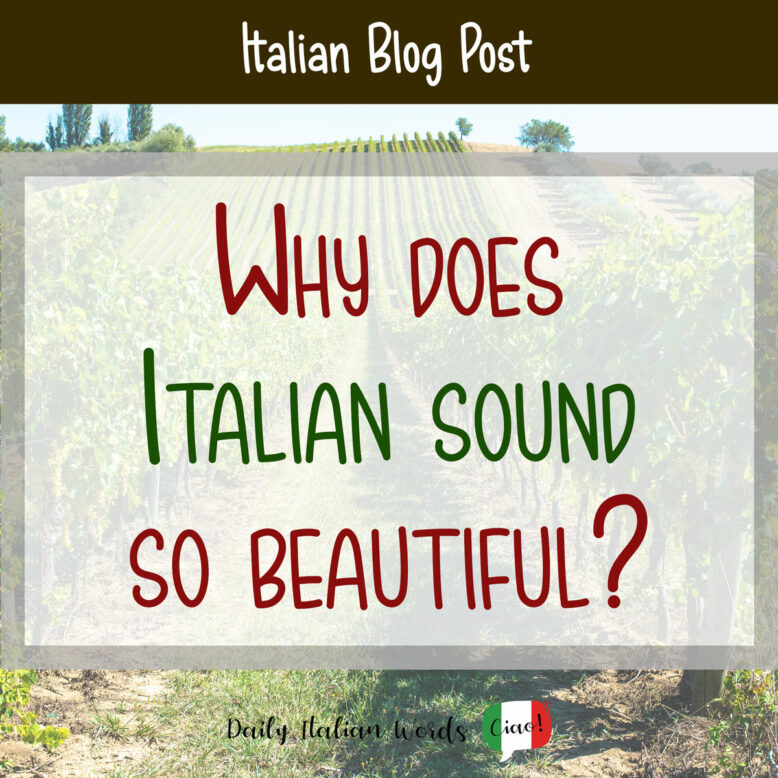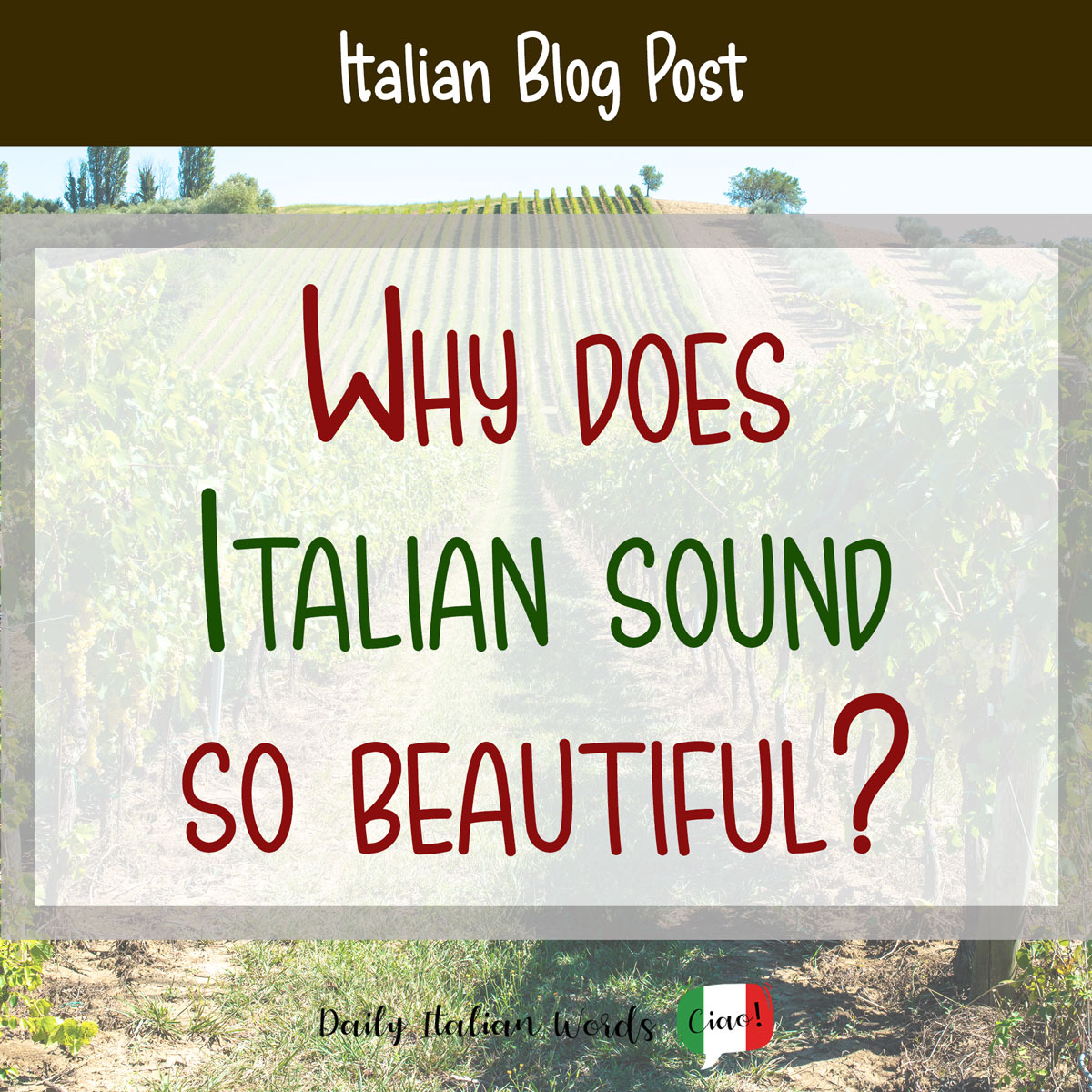Italian is at the heart of Americans (as well as Brits, Australians and anyone else who speaks English). The vast majority of us have a soft spot for Italian accents. We love the sound of Italian. but why? What makes Italian so beautiful, romantic, and generally enjoyable to us?

Depending on which researcher you ask, you’ll get different answers. Linguists (people who study the science of language) will tell you one reason: we view Italian culture, and their language, through a romanticized lens. Phoneticians (people who study phonetics and phonology) would cite another reason: consonants, vowels, syllable stress, and patterns sound pleasing to us English speakers.
But more likely, any other motive that these two scientists, and any other scientist, ever postulated was correct. The reason we love Italian is a combination of countless reasons.
Since the Middle Ages, Italian linguists have worked to develop a beautiful, melodious voice. If we look back in history, we see that Italian as we know it today was (and, let’s be honest, still is) diverse region by region, city by city. Medieval Italians from Veneto spoke a different form of “Italian” than Italians from Calabria.
In the 13th century, a group of literary masters, the Sicilian School, wanted to Improve Italian. They hoped to shape and modify Italian into a language worthy of the best poetry and novels. The school seeks to find the greatest works of literature and uses the author’s template to define new levels of Italian excellence.
In the centuries that followed, writers and poets found the highest level of artistic perfection in the works of Tuscan artists Dante, Francesco Petrarch, and Giovanni Boccaccio. Dante was a Florentine, and his works reflect his Florentine dialect. Petrarch and Boccaccio, although not from Florence, followed Dante’s example and also wrote in the Florentine style. The works of these three writers, all inspired by ancient Latin, became cornerstones of Italian literary excellence; their shadows became the established pinnacle of Italian beauty.
Fun fact: When Italy merged from city-states into a unified country, Italians needed to decide on a dialect to be the official standard of the Italian language. Due to the linguistic and literary history of Florence, the Florentine dialect was chosen as the norm that all schools and merchants in the country should use. This concept is very similar to today’s view of English as the official language of international business.
According to phoneticians
According to phoneticists, Italian is pleasantly perceived in our ears for a number of scientific reasons. First, the purity of the vowels.this Italian has 7 spoken vowels (compared to our 20 English). The 5 vowels can only be pronounced one, and sometimes two, ways. Without exception. The neutral vowel schwa ⟨ə⟩ is a vowel that occurs frequently in unstressed English syllables and does not exist in traditional Italian. Clear voices, easy to read and pronounce, give Italian a satisfying consistency.
Second, Italian uses far fewer glottal stops and aggressions than English. Similarly, Italian has an even distribution of vowels and consonants. In fact, it is extremely rare to encounter Italian words with many consonants in a row.For example, if you use the Italian phrase We go home (We go home), you will find that the ratio of vowel pronunciation to consonant pronunciation is quite even. This distribution of sounds and lack of glottal articulation creates an overall sound that is more fluid than English.
Another contributing factor to Italian’s sweet fluency is that the vast majority of words end in vowels. No harsh endings, clipping a word to the end and harshly disconnecting it from the next word in the phrase. This linguistic aspect allows smooth, almost melodic sequences of sounds to flow gracefully into our ears.
However, the beautiful rhythms that occur naturally in Italian come in the form of consonants.In Italian, consonants have unique phoneme duration, whose meaning is based on .This phenomenon is most pronounced in words containing double consonants, such as the word andttelectronic (seven), PEnA (Pen) and PatwoA (ball). If you pronounce it with a single consonant, the meaning changes completely: seven (Thirsty), Pena (punish) and Pala (shovel). It is these double consonants that give Italian its unique rhythm, both in singing and in speaking. All of these linguistic concepts add to the musical quality of the Italian language we’ve come to love.
All of these linguistic concepts add to the musical quality of the Italian language we’ve come to love.
according to linguists
Why is the Amalfi Coast so popular as a honeymoon destination? Why do all the voice teachers insist that their students learn Puccini’s arias?Why I love you (I love you) Make us ecstatic? Answer: Because it’s Italian.
Even after the complexities of phonetics and melodic and rhythmic speaking, there is still something to be said about sociocultural perspectives. According to linguists, our perception of Italian is rooted in our perception of Italian culture as a whole. When you think of Italy, you probably picture gourmet cuisine, lavish fashion, grand operas and romantic gondola rides along the Grand Canal. These mental images play out subconsciously when you hear Italian. We equate it with art. If we equate Italian with power, economic prestige, and military prowess, we might think Italian sounds powerful, and might even become a more common second language in the United States. Instead, we equate Italy with great food, a long and rich history, and lavish art. For this reason, we also equate this language with notions of delicacy, luxury, attractiveness, and of course romance.
From another perspective, linguists also agree that part of what we love about Italian lies in its similarities to English. Italian sounds familiar to us. Many of the individual sounds that make up Italian also appear in our English.compared to the harsh sound not familiar with mandarinItalian sounds familiar and therefore pleasing to the ear.
in conclusion
So, why does Italian sound so wonderful? Is it a delightful similarity between our languages? Is it a psychological equation of fine art and beautiful architecture? Or the smooth connection of phonemes? In fact, no scientist has been able to definitively declare a possible motive as the only reason we like Italian pronunciation. There are many reasons why we English speakers love the sound of Italian. But how nice is it?

